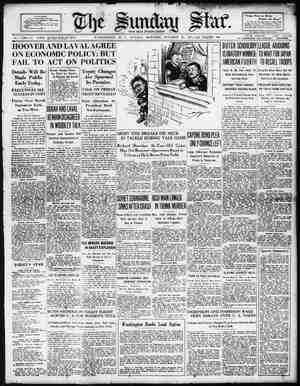Evening Star Newspaper, October 25, 1931, Page 75
You have reached the hourly page view limit. Unlock higher limit to our entire archive!
Subscribers enjoy higher page view limit, downloads, and exclusive features.
he Sunfy Star Magaszine WASHINGTON, D. C, OCTOBER 1931, 25, - Art Notes Features “A Billion Wild Horses” That Have Gotten Qut of Hand in the Modern Age— But If Machines Were Eliminated the World “Would Need Five Thousand Million Slaves to Keep Up Production”—T he Paradox of Overproduction. INCE Samuel Butler's “Erewhon”—and even before—the idea of mechanical in- vention as a frankenstein monster that will some day turn and destroy— or, at least, enslave—human kind has been a frequent subject for the imagi- nation. Today the chorus affirming this onrushing doom is loud and repetitious. The outcome is so graphically pictured by able analysis of graphs and tfends and cycles that one wonders if Thoreau's retreat on Walden Pond is not in danger of being overcrowded with these refugees from mechanization. (Parking space there, it should be noted, is limited.) The machine, we are told, is “a billion wild horses” that have somehow got out of hand and have themselves turned slave driver, and are riding Western civilization with a ruthless hand. The *“wild horses” have already chased some millions of us out of our jobs; they have piled up surpluses of food and textiles so huge that millions of us are near starvation and contemplate the coming Winter with acute ap- preliension; they have made life so noisy and hurried that machineless Mexico is recom- mended as a paradise where one may loaf and § o g s L By George W. Gray - invite the soul without fear of food shortage, blizzards or the vagrancy law. OST of these criticisms have come from economists, historians and others of the so- called humanities, but recently a representative of the natural sciences added his voice to the hue and cry. Dr. C. E. K. Mees, research di- rector for the Eastman Kodak Co. expressed his doubt that engineering progress has been & blessing to mankind. " “Will any student of history agree,” asks Dr. Mees, “that the inhabitants of an American city are, on the whole, happier than those of a Greek or a Babylonian city of the past? This is a thing difficult to assess, but for myself if I could exchange the life that I lead in & modern city for a life in Athens of the Periclean Age or in Thebes under the eighteenth dynasty, I should undoubtedly accept it. “In those days there was more leisure, less pressure, more opportunity for the exchange of ideas, less emphasis on material things. There is little that a man can get today which he could not have had in Athens.” I asked Dr. Karl T. Compton about this. Dr. Compton is president of the Massachusetts In- stitute of Technology, & school which probably is responsible for more industrial explorers, more inventors and engineers than any other incubator of mechanization on this continent. And yet, Dr. Compton himself is not an en- gineer nor an industrialist, but a pure scientist whose original work in atomic physics gives him leave to speak respresentatively for the good fellowship of rese.arch. “My first thought,” answered President Comp- ton, “is that a man’'s enjoyment of Periclean Greece or eighteenth dynasty Egypt would be dependent on his political status—on whether he was a member of the small aristocratic class that had the leisure, the freedom from “ pressure, the sufficiency of material things which allowed them opportunity to exchange ideas and to live the cultural life of intellece tuals, or a member of the many times larges group of slaves, “Without the slaves there could have beem no leisure for the arictocrats, and every pam trician of intellectual detachment and philos sophical discourse demanded grinding hourg of brutish labor on the part of human slaves.® “It is said that 100,000 men in slavery worked 30 years to build the great Pyramids of Egyp8, driven by the lash and dying by the thousandg from overwork and disease. The Panama Cam nal, ¢ work of equal magnitude, was built is a third of the time by free men, comfortably housed, well fed, well paid and safeguarded by sanitary measures, which are as truly a producl of the machine age as the giant shovels and dredges and engines with which they worked. “The glory of the machine,” added the sche entist, “lies in this: That it has taken from the overloaded muscles of men and women ifwm numerable burdens and agonies and transferrod them to the steel muscles of machinery. “If we had to abolish the machine, to pulj back into muscles of men all the labor now performed by hydraulic, steam, electric amd gasoline power, we should need, as Dr. Williag
